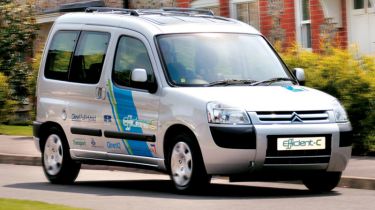Citroen Berlingo
Its blend of power sources mean it meets some tough emissions and fuel consumption targets
With hydrogen fuel cell-powered cars still a long way off, hybrids are the way forward for now. And the Efficient-C certainly makes sense. Its blend of diesel and electric power means it meets some tough emissions and fuel consumption targets. The only barrier at the moment is price - but once this is solved, the company will have an excellent diesel hybrid.
While Toyota and Honda argue about which firm introduced the petrol hybrid to the UK first, Citroen looks set to trump both with an even more frugal diesel version.
Called the Efficient-C, this oil-burning hybrid Berlingo improves economy and CO2 emissions by 30 per cent over a regular diesel car, and the drivetrain should appear in the next-generation C4 in a few years' time. It's the result of a collaborative British Government-funded project that includes PSA Peugeot Citroen, engine specialist Ricardo and electronics experts at QinetiQ.
The Efficient-C uses a 92bhp 1.6-litre HDi turbodiesel, an electric motor, lithium-ion batteries and a SensoDrive automated gearbox. It works in a similar way to most hybrids, with the electric motor powering the car at low speed and the diesel taking over as you go faster. Under braking, energy is stored by the batteries, while at a standstill, the engine switches off. The result is a claimed 75mpg combined and CO2 emissions of only 99g/km. In comparison, the Toyota Prius returns 65mpg and puts out 104g/km.
So what's the catch? Well, predictably, it's the cost. Citroen estimates that the diesel hybrid technology adds £3,000 to the price of a Berlingo, which is why a production version won't go on sale until 2010. By that time, it is hoped that the cost of the technology will have halved.



